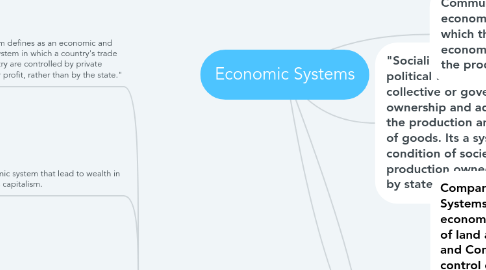
1. Types of Economic Systems: Capitalism, Socialism, and Communism.
1.1. "Capitalism defines as an economic and political system in which a country's trade and industry are controlled by private owners for profit, rather than by the state."
1.2. The economic system that lead to wealth in the world is capitalism.
1.2.1. Capitalism business is operated for profit and owners decide on production, pricing or service or goods, and employee rates.
1.2.1.1. "Capitalism is the foundation of the United States economic systems."
1.2.1.1.1. State Capitalist is the combination of the freedom markets and government control. "The state organizations of a nation and its territorial subdivisions and localities—protects and provides a legal framework for businesses operating through markets. In state capitalism, broadly defined, the state actively fosters, subsidizes, provides services to, regulates, and sometimes controls investor-owned business."
1.2.2. Capitalism all or most of production and distribution such as land, factories, stores are owned by individuals
1.3. Business owned are operated for profit. No country is purely a capitalist. Government determines minimum wages, sets farm prices, and lends money to some failing businesses
1.4. An economic system in which the means of production of good or services are privately owned and operated for profit. Capitalism is designed to operate in free-market. Free market rights are the following: 1. The right to own private property. Private ownership means individuals can buy, sell, or use property and pass the property to their family. 2. The right to own a business and keep all business property. Profit is a form of incentives for business owners. 3. The right to freedom of competition. Individuals or businesses can compete in selling or promoting goods or services. 4. The right to freedom of choice. No obligations – Freedom to make a decision what is best for yourself whether is your career, business choices etc..
1.5. An example of capitalism are countries such as United States, Hongkong, and Singapore. These countries are open to international trade, finance, and technology. Hongkong is a hub for global trade and investment. Singapore is another country that is an example of capitalism. It has low tax and the freedom for business to operate trade internationally.
2. "Socialism defines as a economic political theories advocating collective or government ownership and administration of the production and distribution of goods. Its a system or condition of society that the production owned are controlled by state."
2.1. The benefit of Socialism is social equality. Get the same benefit whether you work hard or not which cause people to work less hard.
2.1.1. Free education, healthcare, childcare, and funding government programs.
2.1.2. Benefit employees for longer vacations, work less hours, and provide employee benefits.
2.2. The importance of socialism takes income from the wealthier people and redistributes to the poorer people.
2.3. Socialism results in fewer inventions and less innovation.
3. Communism defines as an economic and political system in which the government makes all economic decisions and owns all the production.
3.1. Communist countries does not allow citizens to practice religions, change jobs or select place to live. No freedom.
3.1.1. Communism government does not keep tract of what is being produced because prices does not affect supply and demand. The government decides on what people need. Communist countries suffer severe economic depression. Cuba and is one of the countries that suffer economic depression. Cuba suffers from lack of goods and services. The 5 Countries that are communist is North Korea, Vietnam, Laos, and China

